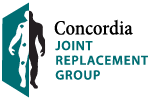A revision joint replacement is done to replace maljuntioning previously implanted joint prostheses. Also called revision arthroplasty, revision joint replacement is often more complicated with less predictable results than primary (first time) joint replacement.
Because of the many different reasons a revision joint replacement may be done, surgery decisions are made on an individual basis. Not all revision joint replacements require the replacement of all parts of the implanted joint. In some cases, parts of the original implant may still be in acceptable condition while others may need to be replaced.
Reasons a revision joint replacement may be needed include worn-out implants, implants coming loose from the bone, infection of a replaced joint, and instability or misalignment of an implanted joint. Much of the information applicable to the original (or primary) joint replacement in terms of preoperative, intraoperative, and postoperative care is also true for a revision procedure. However, there are some differences of which you should be aware.
Hospital Stay
The hospital stay for a patient undergoing a revision total joint surgery may be longer than for the original surgery. Hospital stays for the original (primary) total joint replacement average around three days. This compares to 5-7 days for a revision total joint replacement patient.
Blood Loss
As with the original joint replacement, revision total joint replacement is associated with some loss of blood during and immediately following the surgical procedure. The lost blood can be replaced with either: 1) blood that you have donated before the surgery or 2) blood that is donated at an authorized blood bank.
In general, we prefer that patients do not donate their own blood prior to surgery. The blood available through the blood bank is tested with sophisticated and sensitive tests to minimuze the risk of infection. You will be in better physical health if you have not donated blood prior to surgery, although in major hip revision cases you may be asked to pre-donate blood if large amounts of bleeding are expected.
Bone Graft
In revision total joint replacement, a bone graft procedure may be required. Grafting involves the reconstruction of the bone surrounding the implant with new bone. The new bone can either be taken from another location in your own body or from a donor patient. The decision to use your own bone (called autograft) versus donor bone (called allograft) is usually based upon how much bone is needed.
If only a small amount of bone is needed, bone can be obtained from either bone removed during the surgical procedure itself or bone taken from another site (such as the pelvis). For many revision total joint replacement cases, more bone is needed than can be obtained from another site from your own body. When this is the case, donor bone is used.
Similar to blood bank blood, donor bone comes from a certified tissue bank. Certification standards include screening of all donor samples for infectious agents (hepatitis, HIV, e.g.) and the assurance of proper processing so that bone grafts carry the smallest risk possible for use in patients.
Revisions for Infection
In the case of a revision due to infection, depending on the type and extent of infection, you may be told that you need to undergo a 2-stage revision. This involves two surgeries: 1) the removal of the prosthesis and the treatment of the bone to get rid of the infection, and 2) inserting a new prosthesis several weeks later after the infection has been eradicated.
